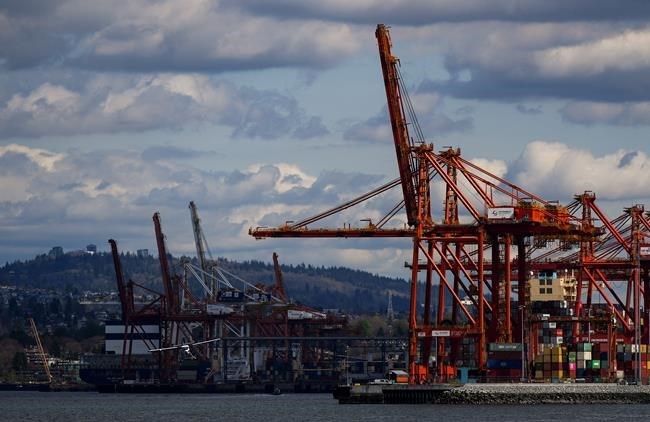VANCOUVER — Federal ministers and British Columbia Premier David Eby are urging the province's port workers and employers to find a way to avert job action after the workers' union issued a 72-hour strike notice and said its members were ready to walk out on Saturday.
The strike notice issued Wednesday by the International Longshore and Warehouse Union Canada affects about 7,400 terminal cargo loaders and 49 of the province's waterfront employers at more than 30 B.C. ports including Canada's busiest, Vancouver.
In a joint statement, Federal Labour Minister Seamus O'Regan and Transport Minister Omar Alghabra said they support the collective bargaining process and urged both sides to hash out a deal at the bargaining table.
"Everyone — the employer, the union, the mediators, and the government — understands the urgency and what is at stake for Canadians and our supply chains," the statement said.
"The parties are responsible for moving goods both nationally and internationally, and industries and consumers would feel the effects of a work stoppage."
Eby said at an unrelated news conference that he's "profoundly worried about the potential impact of a strike at our ports."
He said British Columbians have seen rising costs due to inflation and supply chain issues throughout the pandemic, and a strike potentially increasing costs is something residents cannot afford.
Negotiations between the union and the BC Maritime Employers Association started in February in an attempt to reach an agreement before their contract expired at the end of March.
Both sides had been in a cooling-off period but that ended on June 21, and union members voted 99.24 per cent in favour of strike action this month.
The union said in a statement Wednesday that contracting out, port automation and cost of living are key issues in the dispute.
"Longshore workers kept this province and the country running during the pandemic, and when Canadians were told to shelter in place, our people went to work," the statement said.
"We worked in difficult and hazardous conditions to ensure that the communities where we live, and all Canadians, had the necessary supplies and personal protective equipment to defend against the COVID 19 virus."
The union said management continues to demand concessions.
The Maritime Employers Association said in a statement Wednesday that since bargaining began in March, it has "advanced multiple proposals and positions in good faith, with the objective of making progress and achieving a fair deal at the table."
"Despite today’s regrettable development, we remain ready to re-engage with our labour partners through the federal mediation process, with the desire of reaching a fair and balanced deal at the table that keeps our ports stable and goods flowing for Canadians," the statement said. "We continue to be open to any solution that brings both Parties to a balanced agreement."
Philip Davies, a transportation economist and principal of Davies Transportation Consulting Inc. in Vancouver, said agreements between maritime employers and port workers are typically long-term deals that involve "pretty hard bargaining."
Davies said the union has several options short of full strike action to disrupt port operations in the event negotiations are unsuccessful.
"They can disrupt operations at a single terminal or they could not dispatch enough labour for a single shift," Davies said. "But then of course the response by the employers can be a lock out of the union and the terminals shut down, and so either of those things, any of those things are possible."
"It is, shall we say, a tactical and strategic game," he said.
Davies said the union's counterparts on the U.S. West Coast just reached a rather generous deal, and hard bargaining tactics aren't uncommon when seeking multi-year deals.
"Over the pandemic the shipping lines were making huge profits and I think the longshoremen certainly felt that they should share in that bounty," he said.
On the Canadian front, as negotiations continue leading up to possible strike action this weekend, Davies said dock workers on both sides of the border know the vital role they play in the "marine transport ecosystem" as they seek a collective agreement.
"The longshoremen want to make sure they're covered for all eventualities," he said.
This report by The Canadian Press was first published June 28, 2023.
Darryl Greer, The Canadian Press



